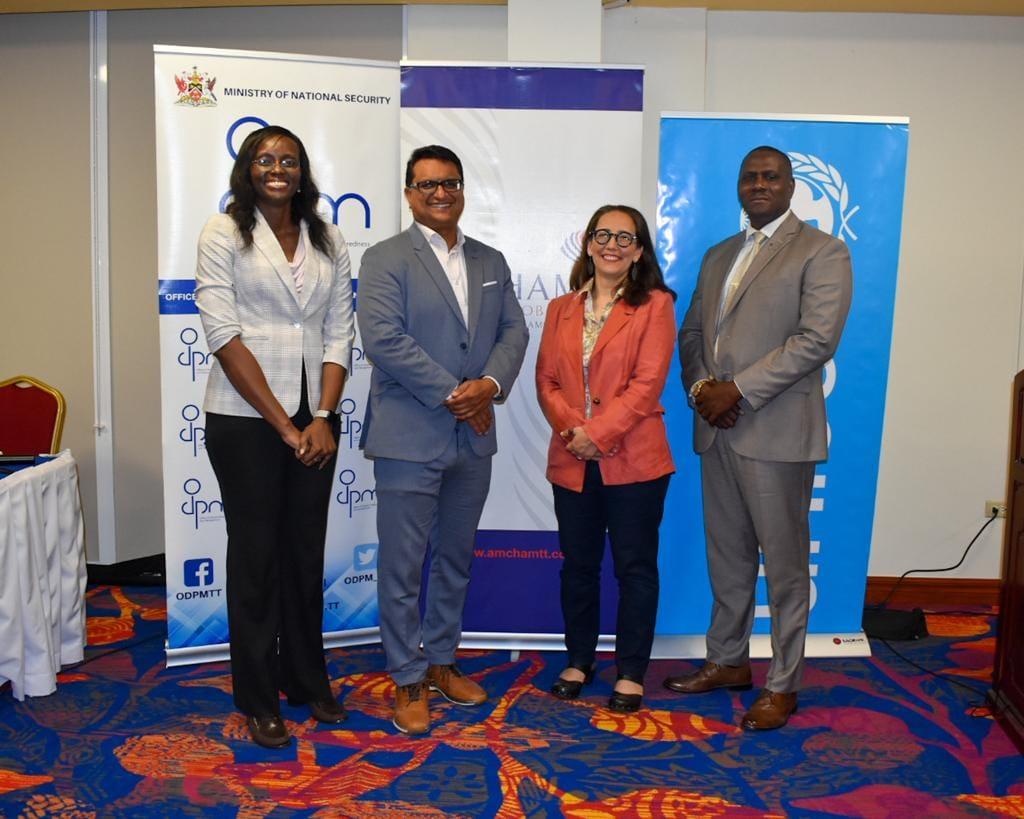Public-Private Sector Coordination
for Disaster Management with the ODPM & UNICEF

Image Caption
(l-r) Melissa Pierre - Senior Trade and Policy Specialist (AMCHAM T&T); Nirad Tewarie - CEO (AMCHAM T&T); Jennie Trow - Emergency Specialist (UNICEF) and Major General (Retired) Rodney Smart - CEO (ODPM)
LINKAGE Q3 (2023) - LEARN, EMPOWER, SUSTAIN
N
atural catastrophes have increased considerably—a worrisome trend that we simply cannot ignore. Given the Caribbean’s smaller economies with less financial resources, ONE major catastrophic event increases our already high public deficit and debts. The public and private sectors need to join forces in terms of resources, expertise and experience in implementing effective disaster risk reduction (DRR) initiatives and policies.
AMCHAM T&T, the Office of Disaster Preparedness and Management (ODPM) and UNICEF hosted a workshop to address this issue in September at the Radisson Hotel, Port of Spain with representatives from the private and public sectors and civil society organisations. The workshop was designed to serve as a platform for open dialogue and knowledge sharing, which would identify challenges and opportunities from which the ODPM and the private sector can derive common goals, and explore innovative strategies, best practices, and lessons learned.
This initiative is part of the activities AMCHAM T&T has undertaken as Trinidad and Tobago’s private sector lead of the Alliance for Resilient Societies (ARISE), which works towards a resilient, prosperous future where fewer lives are lost to disasters; capital assets and investments are risk-informed; and infrastructure is resilient to natural and man-made hazards.
The workshop entitled “Strengthening Public and Private Sector Coordination for Disaster Management in Trinidad and Tobago” aimed to enhance the delivery of humanitarian aid and disaster response, advancing a resource mapping project, which commenced last year, and supporting logistics software for efficiently tracking and accessing goods and services during humanitarian aid operations.
Nirad Tewarie, CEO of AMCHAM T&T, expressed the need for formal engagements between sectors. “We want to strengthen how we come together to mitigate the impact of these catastrophes. At AMCHAM T&T we are very pleased to lead this engagement,” Tewarie said. “The cost of rebuilding public infrastructure and administering relief efforts during times of crisis comes at a huge financial cost to the public sector. That means every organisation and individual must take responsibility for DRR in their operations when dealing with catastrophes.”
Rodney Smart, CEO of the ODPM, said it would take a “whole society approach” to contend with disasters of immense magnitude. “This integrated approach must involve citizens, the public and private sectors, civil society organisations and regional and international partners, to prevent, mitigate, prepare for, respond to and recover from impacts that may challenge the resilience of Trinidad and Tobago.”
Jennie Trow, UNICEF’s Emergency Specialist, recognised the private sector’s expertise and ability to strengthen disaster risk management while upholding the basic rights of children and families in vulnerable areas. “Traditionally, support from business has been more significant during response to sudden onset emergencies. We now need the private sector to be even more engaged in risk reduction, mitigation, and preparedness in order to build community resilience to withstand future crises.”
Trow said businesses could leverage their own expertise, resources, and channels to make positive contributions to long-term resilience and to address humanitarian needs. “We saw in the recent responses to COVID-19, at the volcanic eruption in St. Vincent and the Suriname floods that the private sector can accelerate actions to ensure the needs of the most vulnerable are met.”
The workshop enabled participants to identify common goals and explore opportunities for increased collaboration between business sector organisations and disaster management agencies, recommending innovative strategies, best practices and charting the way forward for creating sustainable partnerships through increased collaboration.